- Home
- Lisa Smedman
Forgotten Realms - House of Serpents 1 - Venom's Taste Page 10
Forgotten Realms - House of Serpents 1 - Venom's Taste Read online
Page 10
That had punctured his pride. Humans were stupid, blundering creatures. Look how the yuan-ti manipulated and dominated them, just as humans and the other lesser races dominated animals. It was the natural order of things. It—
The door opened. Arvin looked up at the strangest human he’d ever seen. The man was short, dark skinned, and bald—and so wrinkled his face looked as though it had shrunk beneath its skin. Yet he was lean and well muscled. His only article of clothing was a loincloth, nearly as dark as he was. Around one wrist was coiled a finger-thin turquoise serpent with translucent yellow wings: a flying snake from the jungles of Chult. Arvin stared at it, transfixed, as it raised its head and hissed. He’d wanted one of those for so long. ...
The bald man moved his hand up and down, causing the flying snake to flutter its wings. All the while, he stared at Arvin, not speaking.
In a distant part of the family manse, Arvin heard a wind chime tinkling. Yet the breeze that had been ruffling his curtains had stopped. The clouds must have cleared; sunlight was shining in through the window now.
“Desire,” the bald man said in a deep voice that was at odds with his thin frame. “I can feel it radiating from you, like heat from a sun-warmed rock. Your emotions run deep and swift—very unusual, in a yuan-ti.”
Arvin stared at the impudent human, wondering when he was going to hand over the flying snake—perhaps he should just take it from the man, instead. The pet was obviously an apology from his mother for her overreaction about the slave girl.
The bald man raised his free hand and flicked a fingertip against the snake’s nose. The tiny serpent recoiled, hissing. He flicked its nose again, and this time the snake bared its fangs. Arvin stared, appalled, as the man gave the snake’s nose another flick, sending it lashing back and forth. He flicked his finger at it again, and again, and again, until Arvin was certain the snake would sink its fangs into the offending human at any moment. Yet, though the snake hissed its fury, mouth wide and venom dripping from its fangs, it did not strike.
The bald man gave a toss of his hand, sending the snake fluttering into the air. Arvin raced across the room, hoping to catch it, but the snake was too quick. It flew out the window. Arvin turned to glare at the human, teeth bared.
The bald man held up an admonishing finger. “Control,” he said.
Now Arvin understood. The bald man was yet another tutor, come to drill him in moderation and self-restraint. A human tutor, this time, to further humiliate him. “The flying snake held its temper,” Arvin hissed back at the man. “So what?”
The bald man chuckled. “You misunderstood my demonstration,” he said. “I held the snake’s temper. With mind magic. But before I could do that, I had to learn to control my own.” He stared for several long moments at Arvin without speaking then asked, “Is this something you would like to learn?”
“Yes,” Arvin hissed, speaking aloud in his sleep. “I want to learn.”
Suddenly the dream became more chaotic. He was no longer a yuan-ti child, but himself—Arvin—an adult human. Yet strangely, his skin was covered in serpent scales. They were as brown as the bald man’s skin had been, and crisscrossed with bands of reddish brown. No, that wasn’t a scale pattern on his arms but a series of red thongs, looped around his body and slowly tightening. Zelia, dressed in a gray robe and skullcap, like the ones the priests at the orphanage had worn, was holding one end of the cord and slowly pulling it toward herself, coiling the cord around one wrist as she hauled it in. She stood on the ball of one foot, her other leg twisted up against her chest, the ankle tucked behind her neck. “Control,” she said, the word somehow coming out as a hiss. Her jaws opened wide. Hot, stinging venom dripped onto Arvin’s temple as she leaned over him, mouth opened, fangs bared—
Arvin’s eyes sprang open. Suddenly he was wide awake. Someone was leaning over him, touching his shoulder. A dark silhouette in the moonlight with long, loose hair.
Throwing himself to the side, he called his dagger into his glove. In an instant he was on his feet—and then he recognized Zelia. “By the gods,” he gasped, holding his weapon between them. “What did you just do to me?” He rubbed his temple and winced. The headache was still with him.
Zelia remained kneeling, hands on her knees. “What do you mean?”
Arvin blinked, trying to clear his head of the disturbing images. “That dream. I was ...”
“Someone else?” Zelia asked, rising slowly to her feet.
Arvin nodded. “A yuan-ti. A child. A ... girl.” The latter was something he’d only just realized—that he’d been female in both of the dreams.
“Sometimes when a psion sleeps, a power manifests spontaneously,” Zelia told him. “You obviously manifested a telepathic power that allowed you to peer into another person’s mind and listen in on her thoughts. That it was a yuan-ti is hardly surprising in a city with more than two thousand of us. Your mind tried to make sense of what the power showed you and turned it into a dream.”
Arvin stood, considering. Was that what he’d just been doing? Looking in on another person’s thoughts and knotting them into his dreams? It hadn’t felt like a dream. Not until the last, chaotic part that had woken him in a cold sweat. That last segment was easy to explain—it was a jumble of his old memories and fears, combined with fragments of what had happened earlier today, including the headache that just wouldn’t go away. But the first part had felt like ... a memory.
Arvin stared at Zelia. “It wasn’t just any yuan-ti,” he said slowly. “It was someone trained in ‘mind magic.’ That girl was you—wasn’t it?”
Zelia smiled. “I must have been thinking about my childhood.” Her smile abruptly vanished. “The Pox have returned to the sewer chamber.”
“They have?” Arvin asked, all thoughts of the dream driven instantly from his mind. He looked up at the sky and saw that it was past Middark. “Was my friend with them?”
“I saw two men. Neither was your friend. It looked as though they were waiting for something—or for someone.”
She gave him directions to the sewer entrance he would use. It was just a short distance away, inside a slaughterhouse—one that had recently been shut down by the militia after its owners were caught butchering cattle that had succumbed to the rotting hoof disease and passing it off as quality meat.
“How appropriate,” Arvin muttered. He slid his dagger into the sheath at the small of his back and picked up his backpack. He pulled out one of the potions he’d purchased earlier, a clear liquid with a sweet scent that lingered in the air even though the tiny bottle that held it was stoppered. The rogue who had sold it to him had assured Arvin it would purge any disease from his body, even ailments that were the result of clerical magic.
Arvin transferred the bottle to his gloved hand and whispered the word that made it disappear into an extra-dimensional space where it could neither be seen nor smelled. The last thing he needed was for one of the Pox to spot the bottle and recognize what it held.
He put on the backpack and nodded at Zelia. “Tymora be with me, I’ll have some answers for you soon,” he said. Then he realized something. “How will I get a message to you?” he asked. “Do I meet you back here?”
“No,” Zelia replied. She opened her belt pouch and pulled from it a stone that glittered in the moonlight. It was dark blue, flecked with gold, about the size and shape of a thumbnail, and flat on one side. Arvin nodded, recognizing it by its distinctive color: lapis lazuli, with inclusions of pyrite. He extended his right hand, palm up, for the chip of stone.
Then he stiffened in surprise. He was no gem cutter. How in the Nine Hells had he known what type of stone it was?
Zelia tipped it into his palm. Arvin used a finger to flip it over. Its rounded surface was cool and smooth, but the flat surface was warm.
“When you have something to report, this will allow you to manifest a sending,” Zelia said.
Arvin gave her a puzzled look. “What’s a sending?”
“A psionic p
ower—one the stone will allow you to manifest, even though you haven’t learned it yet,” she continued. “You can send a brief message to me—no more than two dozen words, and only once per day—and I can reply to you, in turn. The distance separating us is not a factor; your message will reach me, no matter where I might be.”
“And no matter where I might be?” Arvin asked.
Zelia nodded.
“I see,” he said. “It’s a contingency plan. In case something happens to ... prevent me from returning.”
Zelia’s answer was blunt. “Yes. In order to use the stone, you must place it over your third eye.”
“My what?”
“You used it earlier tonight, when you manifested your telekinetic power. Place the flat surface of the stone here”—she touched a finger to a spot between her eyes, just above her nose—“and it will adhere.”
Arvin stared at the lapis lazuli, wondering if there was more to it than Zelia was telling him. “Can I put it on later?” he asked. “If the Pox see it—”
“They won’t know what it is. Only another psion would recognize it. But put it on and take it off as you wish. You need only think the command word—atmiya—and it will adhere or release. Just don’t lose it.”
“Why? Is it expensive?”
Zelia’s lips twitched in what might have been a smile. “Yes.”
Arvin stared at the stone. If he did run into trouble—if he wound up a captive, bound hand and foot and without his dagger to cut himself free—having the stone already in place on his forehead would allow him to call for help.
The question was would Zelia answer?
“All right,” he said. “I’ll use it—but I won’t put it on until I need to contact you.” He slipped the stone into his shirt pocket, tucking it safely inside a false seam.
24 Kythorn, Darkmorning
Arvin eased himself through a window and drew the shutter closed behind him. He stood a moment, letting his eyes adjust to the gloom and his nose adjust to the smell. The slaughterhouse stank of old blood, animal excrement, and spoiled meat. The stench was so overwhelming he nearly turned to leave, but he steeled himself by thinking of what would happen in less than seven days and pressed on.
He made his way toward the center of the building, avoiding the stained hooks that hung from the ceiling. As he stepped over one of the troughs used to catch the slaughtered animals’ blood, his foot bumped against something in the darkness. Flies rose into the air with a soft buzzing noise. Looking down, he saw it was a cow’s head, its tongue purple and protruding and both eyes missing. The putrid smell rising from it made his eyes water.
The troughs all led to the same place—a grate in the floor near the center of the building. The spaces between its rusted bars were nearly clotted shut with chunks of decaying flesh, but the crust of blood that had sealed the edges of the grate was broken. Someone had lifted the grate since the slaughterhouse had been shut down.
He removed a hooked tool from his belt and used it to lift one side of the grate. Grabbing the edge of it with his gloved hand, he moved it aside—carefully, so it wouldn’t clank against the stone floor—then stared down into the shaft that led to the sewers. He could smell and hear water gurgling somewhere below, but the shaft was as black as a snake’s heart.
Wetting his lips, he shrugged off his backpack and set it on the ground beside him then rummaged inside it for the second potion he’d purchased. It was in a vial made from glass of such a deep purple it appeared almost black. Arvin pried out the wax that sealed it and sniffed the vial’s contents. It took him a moment to place the scent: night-blooming flowers, underlaid with a hint of something earthy—a root of some sort.
He tipped the potion into his mouth and swallowed. It tasted honey-sweet, with an aftertaste of loam. A heartbeat later, the room seemed to lighten. Murky shadows became distinct objects. A vertical line of darkness was revealed as a chain hanging from the ceiling, and a dark mound in one corner resolved itself into a fly-speckled tangle of cow’s legs, minus the hooves. As the darkvision potion took its full effect, the room seemed to become as bright as day—except that everything was devoid of color. The hooks in the ceiling were a dull gray, crusted with blood that was a flat black. Looking down at his own hands, Arvin saw that his skin appeared gray—a lighter gray than his shirt.
This, he mused, must be how dwarves see the world most of the time. Only when they ventured out of their underground strongholds into sunlight would they see color. No wonder they were such a dour race.
But this was no time for idle thought. The potion would only last so long.
The shaft the grate had covered was square, barely wider than his shoulders. It descended some distance to a horizontal tunnel through which foul-looking water flowed. There was a gap between the murky surface of the water and the ceiling of the tunnel—quite a bit of a gap, almost as much space as Arvin was tall. The tunnel must be one of the main sewage lines.
A hook in the slaughterhouse ceiling, just over the shaft, told the story of how the cultists had descended to the tunnel below. The curved bottom of the hook was free of blood; the cultists had obviously tied a rope to it.
Arvin decided to do the same. His bracelet would have allowed him to climb down, but he didn’t relish the thought of clinging to a wall so grimed with dried gore. He pulled from his backpack a trollgut rope he’d retrieved from its hiding place earlier that night, when he’d gone to buy the potions. It was rubbery and slightly warm to the touch. He tied the unknotted end to the hook and slipped the rest of its coiled length over his shoulder. Gripping the rope just under the hook with one hand, he transferred his weight to it. With his other hand, he lifted the grate and stood it at an angle on the floor, next to the opening. Then he spoke the rope’s command word.
The magical rope lengthened, sending Arvin into a descent down the shaft. He let the grate close above him; its edge pinched the rope as it closed. He descended for a few heartbeats more; then, as soon as the soles of his boots touched the water, he spoke the rope’s command word a second time, halting its magical growth.
He hung there a moment, looking around as he twisted on the rope. He immediately spotted what he’d expected to see—a convenient ledge that ran along one wall of the tunnel. He clambered onto it then used his dagger to cut the rope back to its original length. The freshly grown section of rope immediately began to rot; in a short time, it would fall off the hook, away from the spot where the grate pinched it, and all traces of Arvin’s entrance would be gone. The original section of rope was still intact and could be used again another day. Arvin carefully stored it in his backpack and set off down the ledge, bending over slightly to avoid banging his head against the rounded ceiling.
After a short distance, the tunnel curved. As Arvin crept around the bend, he spotted the chamber to which he and Naulg had been taken. He’d expected to see the two cultists Zelia had just spotted, but the island of stone at the center of the chamber was bare, devoid even of the hideous wooden statue. Where had the two cultists gone? There was no sign or sound of anyone inside any of the other five tunnels that radiated away from the circular chamber, and this tunnel was the only one with a ledge to walk along. Had he arrived just a little too late? Had the cultists left through the tunnel Arvin stood in, passing beneath the grate even as he crept into the slaughterhouse?
He crouched and examined the ledge, but it held no clues. The sewage that mired its surface held no footprints but his.
Deciding he would wade out to the island, Arvin fished out of his pocket a spool of thread with a lead weight tied to one end. He walked to the mouth of the tunnel and lowered the weight into the water until it hit bottom then grasped the thread just above the point where it entered the water. Lifting it, he measured the depth of the water. It was well over his head.
That gave him pause for thought. How had the cultists who had captured them reached the island of stone that lay in the middle of the chamber, especially hauling captives along with
them? They hadn’t swum—their robes had been dry, as had the clothes of Arvin and the other captives. And they hadn’t rowed there in the boat in which Arvin had escaped. It had been neither big enough, nor sound enough. It had obviously been tied up in the chamber, quietly rotting, for years. The hems of their robes had been wet however, as if they’d dragged in water. Had the cultists walked across the water to the island, using magic? If so, the two cultists Zelia had spotted might have strolled away down any of the tunnels, whether they had ledges or not. But which?
As if in answer, a low groan echoed out of the tunnel immediately to the right of the one in which Arvin stood. He tensed, recognizing the sound of a man in pain. Naulg?
He had to find out.
The wall between the tunnels was brickwork, its crumbling mortar offering numerous finger- and toeholds. Activating the magic of his leather bracelet, he began climbing along the wall, glancing over his shoulder frequently. All he needed now was for the cultists to show up. He could hardly claim to have come to join the Pox if he were found skulking around.
Reaching the mouth of the other tunnel, he slipped around the bend and continued into it, still climbing horizontally along the wall. A short distance ahead was a small, square door, up near the ceiling of the tunnel. As Arvin neared it, he saw that the door was open slightly; it gave access to a low-ceilinged corridor. The door was made of wood but was faced with bricks; when closed, it would blend with the wall of the sewage tunnel and be nearly impossible to spot.

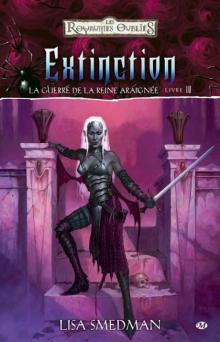 Extinction
Extinction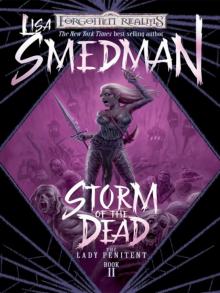 Storm of the Dead
Storm of the Dead Blood Sport
Blood Sport The Lucifer desk (s-2)
The Lucifer desk (s-2)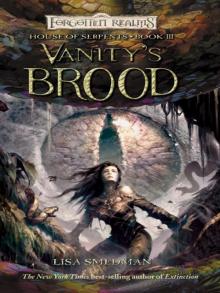 Vanity's Brood
Vanity's Brood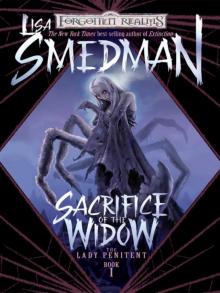 Sacrifice of the Widow
Sacrifice of the Widow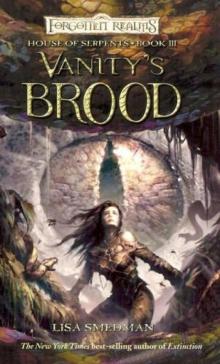 Vanity's brood hos-3
Vanity's brood hos-3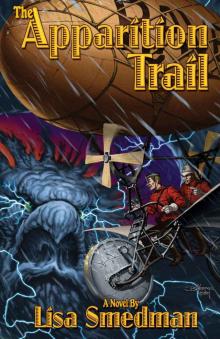 Apparition Trail, The
Apparition Trail, The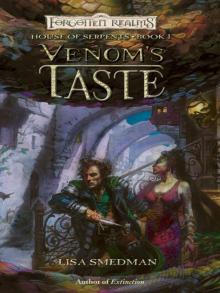 Venom's Taste
Venom's Taste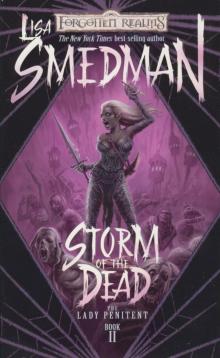 Forgotten Realms - The Lady Penitent - Storm of the Dead
Forgotten Realms - The Lady Penitent - Storm of the Dead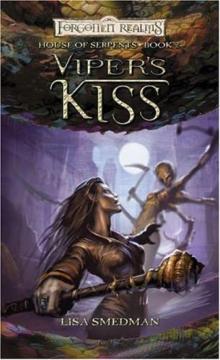 Viper's kiss hos-2
Viper's kiss hos-2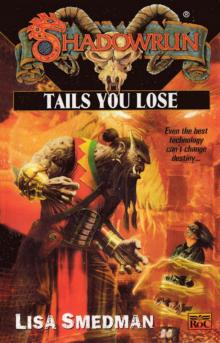 Tails You Lose
Tails You Lose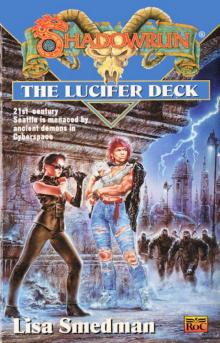 The Lucifer Deck
The Lucifer Deck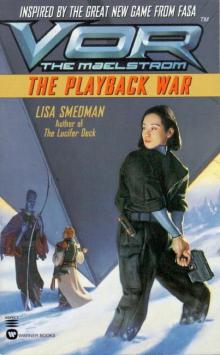 Vor: The Playback War
Vor: The Playback War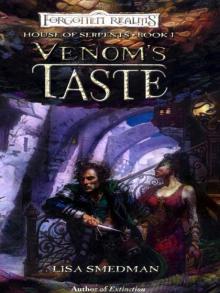 Forgotten Realms - House of Serpents 1 - Venom's Taste
Forgotten Realms - House of Serpents 1 - Venom's Taste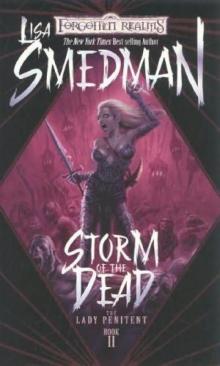 Storm of the Dead зкp-2
Storm of the Dead зкp-2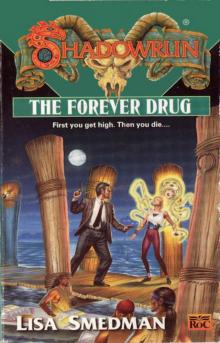 The Forever Drug
The Forever Drug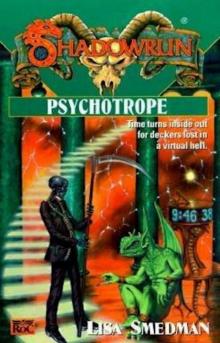 Psychotrope
Psychotrope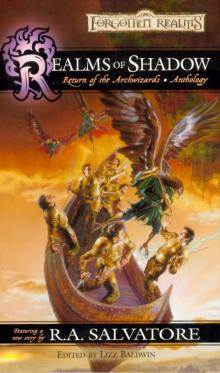 Realms of Shadow a-8
Realms of Shadow a-8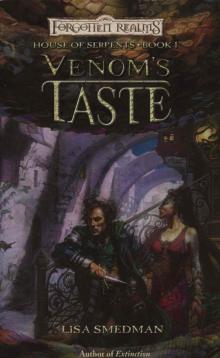 Venom’s Taste hos-1
Venom’s Taste hos-1 Psychotrope s-33
Psychotrope s-33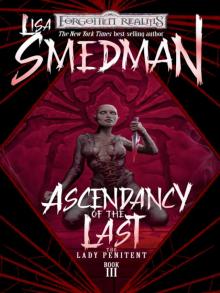 Ascendency of the Last
Ascendency of the Last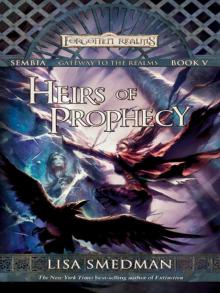 Heirs of Prophecy
Heirs of Prophecy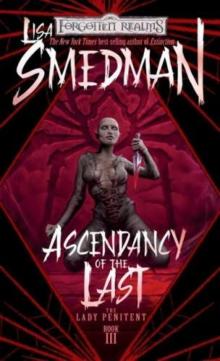 Ascendancy of the Last зкp-3
Ascendancy of the Last зкp-3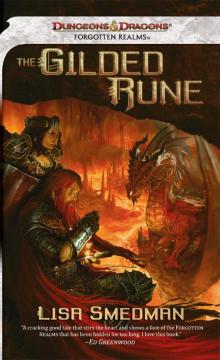 The Gilded Rune (forgotten realms)
The Gilded Rune (forgotten realms)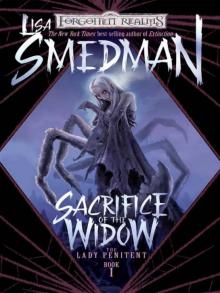 Sacrifice of the Widow: Lady Penitent, Book I
Sacrifice of the Widow: Lady Penitent, Book I The Lucifer desk s-23
The Lucifer desk s-23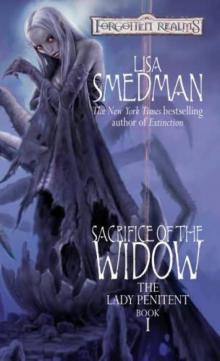 Sacrifice of the Widow lp-1
Sacrifice of the Widow lp-1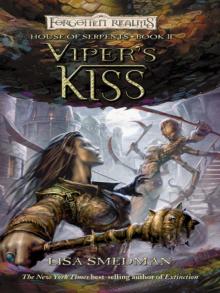 Viper's Kiss
Viper's Kiss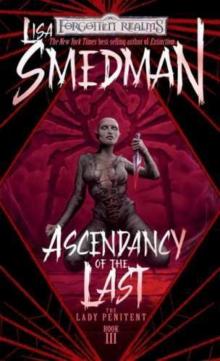 Forgotten Realms - The Lady Penitent - Ascendancy of the Last
Forgotten Realms - The Lady Penitent - Ascendancy of the Last